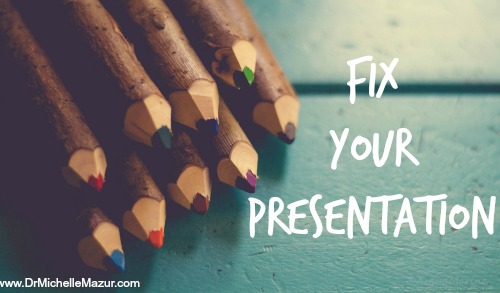Make Marketing Suck Less
3 Steps to FIX the Relationship with your Audience
By Michelle Mazur > March 24, 2015
Filed Under Presentations
You're ready to nail your presentation.
You've prepped. You've practiced. Your presentation is remarkable.
The big day has arrived. You're standing in front of a sea of expectant faces and it's not going well.
You're seeing scrunched up faces flabbergasted by your every word. Some have checked out all together and are checking into their Facebook feeds. And there's one guy in the second row who started snoring LOUDLY.
What do you do if you've taken all the right steps, followed all of my great advice, and still your presentation is BOMBING?
You've got a choice to make. Carry on to the bitter end and hope the audience doesn't come after you with pitchforks or change course.
Here are 3 steps to help you adapt to your audience on the fly and ultimately FIX it fast.
Step 1: Face the music
If you think it's going badly, the first thing to do is a reality check.
Have you really lost your audience or is there just one or two people giving you stink eye?
Ignore the haters (because as Taylor Swift says “Haters gonna hate, hate, hate”) and laser focus on the members of the audience who are engaged and listening. If you need a boost of confidence, find your SAM (Spectacular Audience Member).
However, if a large portion of the audience looks lost or checked out, it's time to face the music.
Acknowledge that you've lost them. This is not an easy step for your pride, but it can pull your presentation out of the fire and get it back on track.
Say something simple like, “Looking at the crowd, I'm seeing some confused expressions.”
Step 2: Investigate
After facing the music, it's time to probe the problem with your audience's help.
Ask the audience what questions they have or at what point did you lose them. No one likes to be the first to pipe up and admit that they don't understand. But asking is powerful and when some brave soul pipes up with what they didn't understand or where you lost them, you've got a new opportunity to salvage your relationship with the audience.
It starts a dialogue between you and the audience. You can answer their questions and address their concerns.
The challenge for you as the speaker is being prepared well enough to answer their questions which is why I tell my speakers to do step number three.
Step 3. Multiple eXamples, stories and case studies
Be prepared with lots of examples, stories and case studies!
You should be able to explain the content of your presentation in a variety of ways.
When I was professor or when I did technical presentations, I came prepared with a host of stories to tell. If my audience is not responding to one explanation, I am ready with another. If an example is not hitting its mark, I've got handy alternative. Being prepared with multiple explanations and examples, looks like I am spontaneously adapting on the fly, but I am not! I've prepared in advance.
Bonus tip: After you presented your alternative explanation, check in with the audience. Ask if they understood it. My friend and instructional designer, Breanne Dyck, recommends fist to five.
Ask the audience how well they understood your explanation. A fist means they don't understand it at all and a five means they get it and could take action on it. If you've got 4s and 5s, you're golden.
When your relationship with the audience begins to crash and burn, how do you FIX the problem?
P.S. If you'd like support, feedback, and accountability to nail your next presentation, join The Speaking Collective small group public speaking program with a mastermind twist.
Create Your One-of-a-Kind Message
Your 3 Word Rebellion is the Key to Growing Your Business & Impact







